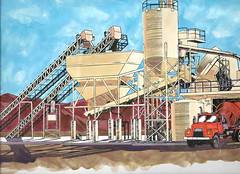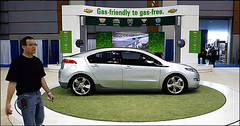"The stimulus package should boldly be stimulating public transportation"

Concrete Plant, Concrete Plant Manufacturers Bureau.
From columnist Derrick Z. Jackson of the Boston Globe, in "Another gift for the auto industry":
The stimulus package should boldly be stimulating public transportation. Based on the American Automobile Association estimates of driving costs, the American Public Transportation Association calculates that Americans who rely on public transportation can save $8,368 a year. Boston leads the United States in calculated annual savings, at $12,285.
That dwarfs a $1,500 tax credit [for buying a car]. Mikulski's plan totals $11 billion. That is another bailout on top of the $17.4 billion General Motors and Chrysler received in December.
As Americans sweat out pink slips, it is insane for the Senate to seduce consumers into more debt. It goes against everything Obama promised to prop up an industry that so bitterly fought the future that the top-five selling cars of 2008 belong to Toyota, Honda, and Nissan.
Mass transit needs far more stimulus help to offset local budget cuts, but cannot get it because some say buses, trolleys, and trains are not "shovel-ready." America's automakers keep getting aid, even when a bailout is only a shovel to dig their own grave.
And Ken sends us notice of this article from Progressive Magazine, "The Myth of the Efficient Car," which makes the point that greening automobility is an oxymoron, that it is great for spending and for jobs, but lousy for the environment.
Let’s get something straight about green industry: in its basic form it means we all have to buy new stuff … lots of it. As an industrial policy that will create jobs and increase spending, it’s pretty sound. As an environmental policy, it’s largely a fraud.
Nowhere is it more disingenuous than the pursuit of the fuel-efficient car. In their effort to stave off collapse of their industry, auto executives have continually cited their efforts are building the high-efficiency cars of the future. The problem is, there are no cars of the future, and the looming catastrophe of global pollution, including climate change, will never be solved by building more cars – efficient or otherwise.
We’d desperately like to believe that there is a way to preserve our car-centered civilization, while simultaneously placating the gods of atmospheric warming. ...

Chevrolet Volt is a plug-in hybrid vehicle being produced by General Motors. Photo Credit: By Alex Wong -- Getty Images Photo.
Optimal mobility, economically sound policies, reducing energy use, increased demand for natural resources by the rest of the world (the U.S. consumes about 1/4 of the world's resources annually, and has but 1/16 of the world's population), and reducing carbon dioxide emissions isn't reconcilable based on an automobility+sprawl economic, transportation, and land use paradigm.
Given the likelihood of needing to make significant changes, the point that Derrick Jackson raises about the impact of reduced spending on automobiles contributing significantly to household income begins to look better and better.
It's worth reading "The Myth of the Efficient Car" because it discusses the issues of car usage, energy, and greenhouse gases from a more scientific perspective. In short, the greenest possible car still wastes a lot of energy to move people around, and is supported by an infrastructure that is wildly destructive.

Joe Palooka comic strip by Ham Fisher. (I think this was about a trip across the country, via train, of the Magna Carta.)
Labels: car culture and automobility, energy, environment, environment and behavior, sustainable land use and resource planning, transportation planning



0 Comments:
Post a Comment
<< Home